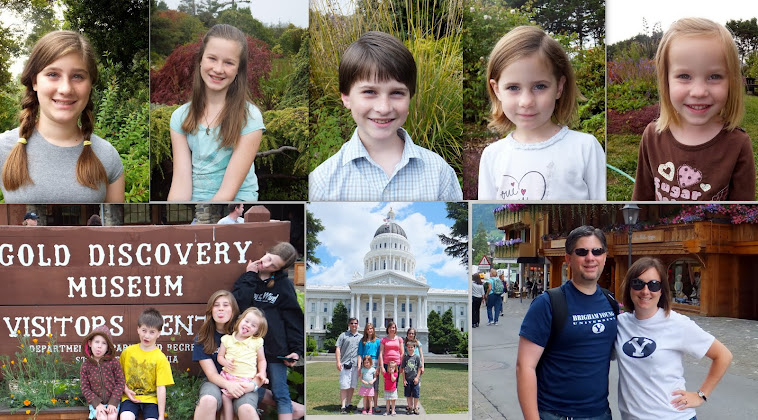PERSONAL PHILOSOPHY
I have been studying child development and education informally for most of my life. I had some formal academic studying in college where I majored in Elementary Education for a time (before deciding to switch to history). Since college, as I've raised my own children, I have spent countless hours studying on my own – including reading the works of famous child educators such as Maria Montessori, Charlotte Mason, John Holt, Raymond and Dorothy Moore, and others. It's like looking for a religion in a sense – I've been searching for things that ring true to me and that appear constant in the world of child-rearing and teaching. I do a lot less of that reading now than I used to do. I believe it's because I have pretty much figured out what, for me and our family, rings true. And now I'm trying to apply the principles as best I can.
The basic ideas I've come to are these:
*For young children, learning in small increments of time (15 minutes) is much better than long, drawn-out sessions
*Living books are better than textbooks
*Outside time is vital.
*Games and activities are better than worksheets
*There is no perfect timetable for learning – every child develops at their own pace. Rushing is worse than waiting too long to teach a concept.
*Children learn through play
*Children today are cheated of their childhoods. We are adults for 60 years, but only children for a few. What's the hurry?
*Choose my (“if my children know nothing else when they turn 18, I hope they know _____”) goals and stick with those. For me, this includes helping my children develop a testimony of the Gospel, having a love of learning, and having a strong work-ethic. Everything else is a bonus.
Let me elaborate on that last thing. If you notice, none of my goals are educationally specific. I know goals should be quantifiable – and I can make these quantifiable by specifying what I mean. But in general, I'm hoping to turn out good people who are CAPABLE of getting the education that they need. There is no way on earth that I can teach them everything they need to know. But I can teach them how to find knowledge, how to stick with a difficult task, and help them know their value as children of God.
METHOD TO MY MADNESS
If I had to describe my home-school method in one word, it would have to be eclectic.
That used to really bother me because I felt it made me sound undisciplined (which I might be) and scatter-brained (which I'm not usually). Now I realize that being eclectic can actually be a good thing. I'm not rigidly following one curriculum. I'm scoping out ideas and creating my own ways to teach my children. It's more time consuming, for sure. But I'm also giving my children educations tailored specifically to our family and their individual talents, strengths, and weaknesses.
I consider myself more of a guide than a teacher. I am always on the lookout and thinking about what each child might be learning. Every year I consider the topics we might study and find the materials we'll need. We embark on our journey together and it's exciting to have a front row seat as I watch my children learn and grow.
We've had some fun studies in the past. I think the most fun thing we've ever done was a summer of Shakespeare which included a visit to Ashland, OR to see a play. The kids still talk about that summer and ask when we are going to study Shakespeare again.
Coming up...favorite resources...homeschooling in high school...a day in our school life...and incorporating young children into the mix.

3 comments:
You're children are blessed to have you not only as their mother, but also as their teacher/guide. It is great that you are willing and able to give them so much of your time in teaching and in loving them. They are great children, who will be amazing adults. Your program sounds great, Kelly!
I'm looking forward to this. I had an epiphony yesterday when a friend told me, "My 3 year-old knows what half, quarter, and whole notes are because she learned it from some program on Nick Jr." I've heard things like that many times, and while I think it's great that their children are learning, I think that it's not the most beneficial way our children can learn.
That statement sounded tragic to me, and I think I know why. I wonder if it's because we (as a society) value obtaining knowledge over the the process of how we obtain it. I want my children to learn musical notation not just because it's good to know, but because in the process, I will be able to build my relationship with them as I teach them.
I guess my kids learning things from me is just a means to the end. My kids can't get a stronger bond with me if they only are learning from a TV (although they can be valuable learning tools).
This is the good, concrete, stuff about how to homeschool that gives me hope and direction! Can't wait to hear the rest of this post!
Best teacher ever 👏👏
Post a Comment